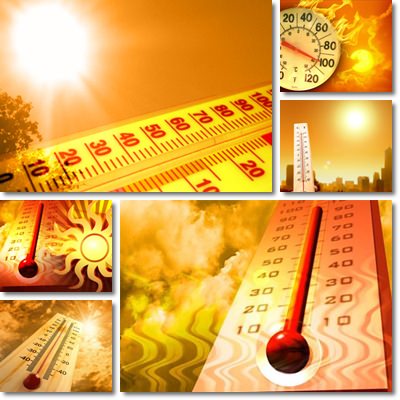Temperatures this year seem to have skyrocketed and the weather outside is getting hotter and hotter, making us lose the little appetite we have left. Sultry weather such as this can easily throw our body off which is why we need to be extra careful with what we eat and drink and in what amounts. The issue of ‘what we should eat to feel good in this hot weather’ is now becoming a big concern for everyone experiencing these current heatwaves.
Hot weather is particularly off-putting for many people and tends to discourage eating which may affect one’s well-being tremendously. Also, to overcome high temperatures, many people increase their water intake, drink cold beverages, go to the pool, eat less and so on. But what should you really do to feel good when it’s hot outside? Find out below some basic guidelines to keep you up and about during the next heatwave.

Tips and solutions for dealing with hot weather
Drink water
When temperatures are high, you need to stay well hydrated and the best way to do this is to drink water. But remember that water too is a diuretic and, when consumed in great amounts, it can lead to massive loss of electrolytes and dietary minerals. So, although it might be recommended that you drink liters and liters a day, you should only drink water when you feel thirsty. This way you stay hydrated and prevent the loss of important essential minerals such as potassium or magnesium.
Take your vitamins
When it’s hot outside, you tend to sweat a lot and urinate almost just as much. Both deplete your body of essential nutrients, notably dietary minerals. You can counteract these nutritional losses by taking vitamin and mineral supplements. Magnesium and potassium, for example, may help prevent fainting, stroke and myocardial infarction, all of which are very likely to occur during hot weather.
Magnesium is responsible for the good functioning of the heart muscle (and all the other muscles in the body), while potassium helps regulate body fluids and blood pressure. Having these two minerals in your system means that you are less likely to faint during hot weather.
You can also opt for a multivitamin. My go-to multivitamin supplement is Supradyn Energy. Not only does it help me cope with the heat, but it also keeps me quite energized and in a good mood as well as helps me sleep better. But I also take singular supplements such as magnesium to boost my mood and energy levels and help me get rid of painful muscle cramps and twitching, and just feel great.
Find out what is the best absorbed magnesium.

Watch out for bad fruits
Many people feel that fruit is the only thing they can eat in summer time. After all, fruits are sweet, easy on the stomach, quick to munch on and full of nutrients. But when temperatures sore, even fruits are hard to preserve well. Let’s take as example a favorite seasonal fruit: the watermelon. It is an ideal summer food that can successfully keep you hydrated and provide good nutrition; it’s cheap and easy to find. However, you can’t always tell how fresh a watermelon is and not all spoiled ones have a strong bad odor. Thus, eating bad fruit is a possibility and it can lead to a bad case of gastroenteritis or even dysentery that can leave you with bad memories for the rest of the summer.
Therefore it might best to purchase local fruits because there is a smaller chance they get spoiled during lengthy transportation to the marketplace or local stores. Remember to also check for freshness and wash both your hands and the fruit very well prior to consumption. Dangerous bacteria can very well live on or in them.
Watch out for pesticides
While there are strict health guidelines that impose restrictions on the use of pesticides, the massive loss that may occur due to hot weather spoiling fruit makes many producers use far greater amounts of pesticides and other preserving chemicals than allowed. If possible, grow some fruit in your backyard: an apple or a cherry tree, a few tomato plants, some raspberries, a blueberry bush and even a fig. If you lack space and time, try to look for organic fruit and rely on seasonal fruits and vegetables, preferably produced locally, and with good traceability.
Avoid coffee, alcohol, sodas and strong teas
If there’s a heatwave about to strike, make sure you drink water and home-made fruit and vegetable juices only. Coffee dehydrates by inducing diuresis, prevents the absorption of dietary minerals at intestinal level, increases blood pressure and worsens acid reflux, gastritis and stomach ulcers. In addition to this, coffee is a vasodilator. The heat outside already dilates your blood vessels, so having one or more cups of coffee will make them even larger and you might feel even worse.
Alcohol dehydrates, sodas and sugary carbonated drinks in general make you even thirstier because they are rich in sugar and also dehydrate, while strong teas such as black or green tea make you nervous, agitated, cause headaches and may increase heartbeats as a result of to their caffeine content. Whenever you are thirsty, opt for bottled water, naturally sparkling or still, freshly-made fruit juices, a sports drink with electrolytes or even some lemonade.
Make sure you eat well
When it’s hot outside many people lose their appetite and tend to eat less throughout the day. Not having enough calories can lead to unpleasant scenarios such as fainting, weakness sensation, lack of energy and nutrient deficiencies. For this reason, it is important to eat small meals throughout the day, every 3 hours or so. Make sure you get your protein, carbohydrates, sugars and a decent calorie intake.
A nourishing breakfast can include scrambled or soft boiled eggs, fresh tomatoes, goat cheese, 2-3 slices of whole grain toasted bread, oatmeal with dried fruits or almonds and so on. For lunch you can enjoy rice with vegetables or lean chicken meat or even a soup (chickpea or lentil cream soup or a cold tomato soup). Dinner should be easy on the stomach with not-so-elaborated dishes: grilled chicken breasts with fresh olives and lemon juice, grilled turkey and eggplants or mushrooms and so on.
Avoid processed foods as much as possible, especially if you are suffering from hypertension (high blood pressure) because such foods are rich in salt and will add to your daily intake, making it difficult to keep your condition under control. If you are hypotensive (have a low blood pressure), remember to always add a few sprinkles of (pink) salt to your freshly-prepared food. Remember they won’t tell you on the news not to eat pizza or other processed foods, but I will. They are not the right choice if you want to feel good in 40 degrees Celsius and more.
Conclusion
While you may not always find time to cook something fresh and simple (but please, do) and gorge on some pizza or cheat and have a cold soda, remember to always take your multivitamin supplements, drink enough water to keep hydrated, eat every 2-3 hours and stay sheltered from direct heat. Avoid going out between 11 a.m. and 16 a.m., but if you do, wear a hat, find shade under a park tree or go to a mall with air conditioning (find out about sun exposure and the best time for it) Also make sure your multivitamins have enough potassium and magnesium in them. If not, talk to your doctor and ask him or her to help recommend something to supplement your missing dosage.
If you have a headache, feel your mouth dry and lips cracked or have a darker urine color, then you are not hydrated enough (find out more about urine colors and what they mean). If you feel dizzy or weak, drink a small glass of room-temperature water slowly; this should help prevent you from fainting, but remember (again) to take your multivitamins. If you feel something is wrong, ask for medical help immediately.
